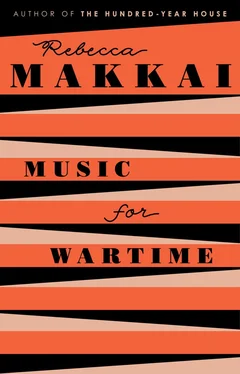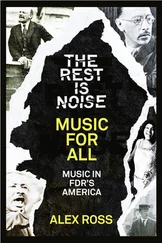Over canapés and cava, a few of us whispered that we didn’t trust Chapman. Keep in mind that we didn’t yet know about his years of struggle, his earnest and energetic paintings. We feared that his life was a gimmick, that he himself was a gimmick, and we feared he was using Ling to advance his own career. But look at the way they leaned on each other’s shoulders! Look at the way Chapman brought Ling his pills and his carrot juice as the party died down, the way he insisted on the couch and blanket, the way he picked up Ling’s cat and held it to his own chest.
We sent Juney Kespert in for reconnaissance. “Take him for lunch,” we said. “Find out what his deal is. Find out what he wants.” Juney was a photo-realist. It made us see her as rational, objective, though that certainly wasn’t true.
You have to understand that Francisco Ling was someone we all adored with a ferocity that had nothing to do with his sculptures or even his suave Brazilian smile, but with his generosity. He was fifty, older than many of us, and to me, at least, he was New York itself. I’d come there from Indiana, a twenty-year-old boy with no more connections than meat on his bones, and although Francisco Ling wasn’t the first person I met in the art world, he was the first who welcomed me. He asked me to show him my work, and I nervously did — a small portrait of my brother — and he closed his eyes and sighed as if deeply and finally satisfied. I discovered later that a lot of us had similar stories, but even then I didn’t doubt his sincerity. The idea that someone might take advantage of Ling’s kindness, of his vulnerability, panicked us.
And so Juney invited Chapman down to Veselka late that summer, and we waited for her pronouncement. She called us one by one. “He’s a decent guy,” she said. “There’s not much to tell. He drinks too much, but who doesn’t?”
I said, “A decent guy who punches sick men?”
“He has a good heart. He needs to be needed, I think. One of those. But tell me why that isn’t perfect for Francisco right now.”
That “right now” stuck with me, and I found myself thinking about it later that night in a cab, my eyebrow against the cold window. This would be the last boyfriend Francisco Ling would ever have. We didn’t need Chapman to be perfect, or even faithful. We just needed him to stick it out till the end. We needed him not to leave Ling on his deathbed. Ling had gotten tested in 1985 with the rest of us — we lined up for that test like Russians for bread — and, like so many, had no idea when he’d been infected. No one was living more than a few years beyond diagnosis those days. I’d bought a suit just for funerals.
It wasn’t long before Chapman felt like part of the landscape. We all wanted to visit Ling, but we were sick of sickness, sick of death. The East Village was a minefield of disasters that year, and when we trekked up to Chelsea it was more for Chapman’s vivacity than for Ling’s pallor and fatigue. We were tired, after all — some of us were dying ourselves — and Chapman had the energy to crack a joke. Unlike Ling, he could jump up to grab a book from the shelf, could explain with great vigor why you needed to take a second look at Käthe Kollwitz.
Ling had a solo show planned for the following spring at the Whitney, with the unspoken but universal understanding that it would be his last. The apartment was filled with the finished pieces, lumpy twisted things lacquered green and yellow, plus a series of quasi-phallic clay reliefs waiting for their final glaze. Missing were the monolithic forms on which Francisco Ling had made his name, abandoned along with his studio, with his ability to walk down the block. For a while he’d been using a shopping cart, leaning on the handle and wheeling it around the work. In the cart were trays with sponges, putty knives, spray bottles, towels, chisels, clamps. But now even that was too difficult, and a rolling stool became his seat. His tools lay on the floor in a dish rack. When I went there in October, Ling was on the couch with a cup of tea. The television blared campaign news, and he asked me to turn it off.
He said, “You remember Kip.” I hadn’t known this was what he called Chapman — at the party, it had still been Christophe — but I nodded. Chapman’s beard had a way of making his eyes the only thing on his face. Just hair and then eyes, spectacular in the way they refracted light. “He never hit you, did he? Kip, did you ever hit him?”
“I didn’t have that honor,” I said.
“Well, he should have.” It was a compliment.
At this point, Chapman brought me a glass of water and their whole bowl of Halloween candy (“I don’t think we’ll get any kids,” he said, “so eat it all”) and told me he’d found a fifty-dollar bill in a library book that morning. Just when they needed grocery money.
“Everything happens to Kip,” Ling said. “He’s a magnet for fortune.”
I wondered if Ling was including himself in that magnetic field — and if so, whether he considered himself good or bad fortune for Chapman. Famous, but sick. Handsome once, but no longer. Living at the Chelsea, but dying there, too. Adored, but needy.
Artforum , in writing about the buildup to the Whitney show, called Chapman “Mr. Ling’s amanuensis.” A careful, glossy word — as if he were taking dictation for Ling’s memoirs, rather than giving him sponge baths. It was a term I’d learned only recently, one that now, when I hear it, brings back New York 1988 in full Technicolor. We were in a terrible state that year, all of us. The big art money was gone with the ’87 crash. We were pinning our hopes, for Christ’s sake, on Michael Dukakis. And yet there was urgency to everything. Each visit was maybe your last, each voice something to be memorized. It was worth ordering another glass of champagne. When I hear “amanuensis,” I see Chapman’s face, his young face, and I see Ling’s hands, cragged and ruined, and I feel like jumping out of my chair to do things, to see people, before it’s too late.
That day, I showed both of them the Polaroids of my new acrylics. Ling shook his head and told me I should go back to oils, that the oils loved me better. I’d have ignored him, but it turned out to be the last thing he ever said to me, and how can you ignore the last thing a great man says to you?
It’s chilling, how you can spend years with someone and be left with only the smallest pile of scraps. That sentence was one of my scraps. And so eventually I went back to the oils, which did, indeed, love me better.

Here’s what happened: In April, on the night of the Whitney opening, Chapman left Ling at home and headed over early. Ling trusted him to check the lighting, the positioning, to make sure the curator hadn’t messed things up overnight. Ling was supposed to take a cab uptown at eight. He was still strong enough to walk out of the building, but he was going to call Juney if he felt too weak. Chapman had helped him dress, had combed what remained of his hair.
It didn’t feel odd to arrive before Ling, to be greeted by Chapman, his beard soft against your cheek, a drink somehow already in your hand, as the sea of patrons and artists swallowed you up. The work was extraordinary — what had looked small and half-finished in the apartment suddenly luminous and monumental, each piece a triumph of fluidity — and we were awed, each practicing, privately, what we’d say to Ling, testing the words on each other first. “It’s gentle,” I remember saying. “It’s like a détente, a melting.” But the crowd never parted for Ling, the room never hushed. Instead Chapman breast-stroked his way through, sweaty and flushed, and grabbed Juney’s arm. “You’re sure he never called you?”
Читать дальше













